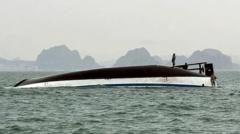Adidas reports anticipated impact of US tariffs, affecting product pricing and raising concerns over consumer demand.
Adidas to Hike Prices Amid US Tariff Costs Soaring to €200m

Adidas to Hike Prices Amid US Tariff Costs Soaring to €200m
German sportswear giant faces rising import expenses, leading to price increases for consumers.
Adidas has announced plans to increase prices for its American customers due to rising US tariffs which will cost the company an additional €200 million (£173 million). Nearly half of Adidas's merchandise is produced in Asian countries that recently engaged in trade agreements with the United States. During the announcement of the company's latest financial results, CEO Bjorn Gulden explained that these tariffs would inevitably raise the cost of products available in the US market.
Gulden acknowledged the uncertainty surrounding customer demand as inflation could be exacerbated by these tariffs. Adidas's leading manufacturing countries are Vietnam, contributing 27% of the brand's merchandise, and Indonesia, responsible for 19%. Just earlier this month, trade deals with these countries resulted in new tariffs, imposing a 20% tax on Vietnamese goods and a 19% tax on products made in Indonesia.
US importers of Adidas merchandise will be obligated to pay these tariffs, prompting the price increase. This pricing strategy mirrors similar moves made by competitor Nike, which indicated it would hike prices on certain footwear and apparel in response to a projected $1 billion (£730 million) tariff expense.
Despite the looming financial pressures from tariffs, Adidas announced a 7.3% revenue increase, amounting to €12.1 billion in the first half of the year, with pre-tax profits surging from €549 million to €1 billion. Footwear sales rose by 9% in the second quarter, while clothing revenue saw a remarkable 17% increase.
The backdrop of these developments includes previous tariff announcements made during Donald Trump's administration, aimed at prompting domestic manufacturing. The US has also inked a 15% tariff deal with the European Union on imports, and while the percentage is lower than proposed figures, some EU officials, including Germany's Chancellor Friedrich Merz, caution that these actions could have significant negative repercussions for transatlantic relations.
In a similar vein, prominent German car manufacturers have voiced concerns over tariff impacts, with Mercedes-Benz estimating €420 million in tariff-related costs this year, while Porsche has implemented price hikes of up to 3.6% to offset increased expenses. Meanwhile, other companies like Stellantis, which oversees brands such as Vauxhall and Jeep, have reported that tariffs have already led to a loss of €300 million.
Gulden acknowledged the uncertainty surrounding customer demand as inflation could be exacerbated by these tariffs. Adidas's leading manufacturing countries are Vietnam, contributing 27% of the brand's merchandise, and Indonesia, responsible for 19%. Just earlier this month, trade deals with these countries resulted in new tariffs, imposing a 20% tax on Vietnamese goods and a 19% tax on products made in Indonesia.
US importers of Adidas merchandise will be obligated to pay these tariffs, prompting the price increase. This pricing strategy mirrors similar moves made by competitor Nike, which indicated it would hike prices on certain footwear and apparel in response to a projected $1 billion (£730 million) tariff expense.
Despite the looming financial pressures from tariffs, Adidas announced a 7.3% revenue increase, amounting to €12.1 billion in the first half of the year, with pre-tax profits surging from €549 million to €1 billion. Footwear sales rose by 9% in the second quarter, while clothing revenue saw a remarkable 17% increase.
The backdrop of these developments includes previous tariff announcements made during Donald Trump's administration, aimed at prompting domestic manufacturing. The US has also inked a 15% tariff deal with the European Union on imports, and while the percentage is lower than proposed figures, some EU officials, including Germany's Chancellor Friedrich Merz, caution that these actions could have significant negative repercussions for transatlantic relations.
In a similar vein, prominent German car manufacturers have voiced concerns over tariff impacts, with Mercedes-Benz estimating €420 million in tariff-related costs this year, while Porsche has implemented price hikes of up to 3.6% to offset increased expenses. Meanwhile, other companies like Stellantis, which oversees brands such as Vauxhall and Jeep, have reported that tariffs have already led to a loss of €300 million.





















